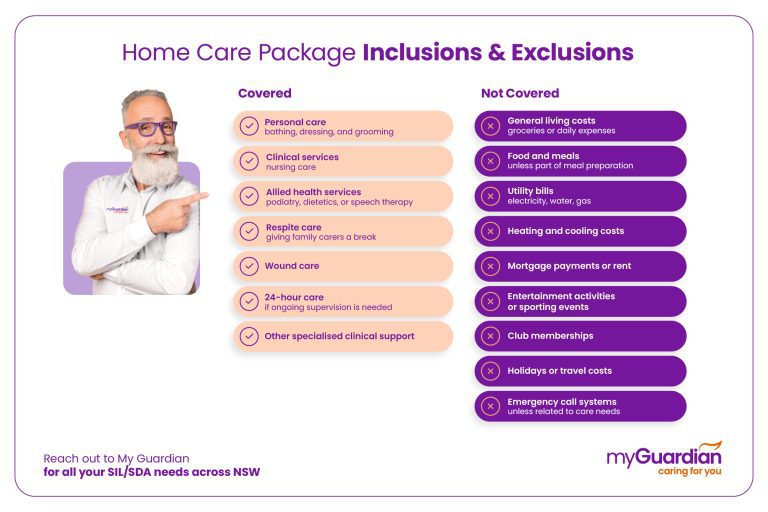Everything About Home Treatment Solutions for People With Disabilities: NDIS Registered Support
Home treatment solutions under the NDIS play a crucial duty in supporting individuals with disabilities. These services are made to enhance everyday living via tailored support, varying from personal treatment to flexibility assistance. Understanding exactly how to browse these options can be complicated. This review checks out the different facets of NDIS home care, from offered services to the option of providers, highlighting necessary factors to consider for those seeking support. The journey toward empowered care begins here.
Recognizing the NDIS and Its Objective
The National Special Needs Insurance Scheme (NDIS) works as a transformative framework created to give support and services for people with impairments. Established to improve the high quality of life and assurance fair access to vital sources, the NDIS encourages individuals by using customized plans tailored to their unique needs. It aims to foster freedom, making it possible for people to seek their personal goals and aspirations.Through an organized approach, the NDIS allots financing for different supports, consisting of education and learning, work help, and community involvement. This comprehensive scheme not just focuses on instant treatment however likewise highlights long-lasting developmental results. By promoting choice and control, the NDIS motivates participants to choose their recommended company, assuring that care aligns with their values and choices. Ultimately, the NDIS stands for a considerable commitment to improving the lives of people with handicaps, promoting inclusivity, and developing a more encouraging society.
Sorts Of Home Treatment Services Available
Different kinds of home treatment services provide to people with specials needs, mainly concentrating on personal care help and respite care alternatives. Personal care assistance gives important support with everyday tasks, while break care uses short-term alleviation for main caretakers. Recognizing these services is vital for making sure the well-being of both individuals with handicaps and their family members.
Personal Treatment Aid
While maneuvering life can offer difficulties for individuals with specials needs, individual treatment support supplies necessary support customized to their distinct demands. This sort of home treatment solution includes an array of tasks designed to advertise independence and enhance lifestyle. Individual care assistants assist with day-to-day tasks such as showering, dressing, grooming, and toileting, making certain people keep individual hygiene and comfort. They may also aid with meal preparation, drug management, and movement assistance. By offering personalized care, these professionals equip individuals to engage more completely in their social activities and day-to-day regimens. On the whole, individual care support plays a considerable function in fostering self-respect and autonomy for those with specials needs, enabling them to prosper in their home setting.

Respite Treatment Options
Break care functions as an essential source for households and caretakers of individuals with disabilities, providing momentary remedy for the demands of everyday caregiving. This sort of service can take different kinds, consisting of in-home respite treatment, where trained professionals go to the home to help with care jobs. Households may decide for facility-based break treatment, where individuals receive treatment in a specific environment, allowing caretakers to take a break. Additionally, some organizations use emergency respite solutions for unanticipated conditions. These choices not only aid alleviate caretaker stress and anxiety yet likewise promote the well-being of people with impairments by using them new experiences and social communication. Generally, break treatment plays a critical duty in sustaining both caregivers and those they take care of.

How to Access NDIS Home Treatment Services
Accessing NDIS home care solutions involves comprehending the qualification requirements established forth by the National Special Needs Insurance Coverage Scheme. People should navigate a structured application procedure to protect the needed assistance tailored to their needs. This area will certainly make clear both the eligibility demands and the steps included in requesting solutions.
Qualification Requirements Described
To get approved for NDIS home care services, people must fulfill particular qualification criteria that examine their scenarios and needs. Initially, applicants need to be matured between 7 and 65 years and have a long-term and substantial special needs that impacts their capacity to perform day-to-day tasks. Additionally, they must be an Australian citizen, an irreversible homeowner, or hold a Protected Unique Group Visa. The NDIS calls for proof of the handicap, usually with medical evaluations or records. People should show that they require assistance to take part in social and economic life. These requirements guarantee that services are routed in the direction of those who really need support, promoting self-reliance and enhanced lifestyle for people with disabilities.
Application Process Steps
Can I Pick My Very Own Support Employees Via NDIS?
The individual asked whether they could select their own assistance workers under the NDIS framework. Usually, participants have the versatility to pick support employees, promoting customized care that straightens with their specific requirements and preferences.
What Occurs if My Needs Modification After Receiving Support?
They need to interact these adjustments to their service copyright if an individual's needs modification after receiving assistance. Changes can be made to the treatment plan, making certain that the support continues to be reliable and relevant for their scenarios.

Are There Limits on How Lots Of Hours of Care I Can Receive?
The specific made inquiries regarding potential restrictions on the number of care hours obtained. Generally, such limits might exist based upon specific policies or moneying setups, stressing the significance of examining contracts and guidelines consistently.
Can I Make Use Of NDIS Financing for Home Adjustments?
The question of using financing for home modifications emerges often. Usually, individuals might utilize NDIS financing for necessary alterations to their homes, making sure ease of access and safety, section upon conference specific qualification standards and standards.
How Do I Deal with Grievances Regarding My Home Treatment Solutions?
To resolve problems about home treatment services, individuals need to first document their problems. Then, they can interact straight with their provider, looking for resolution, or rise the issue to appropriate oversight bodies if needed. Home care services under the NDIS play a crucial duty in supporting individuals with handicaps. Different types of home care services cater to individuals with impairments, largely concentrating on individual treatment help and reprieve treatment alternatives. home care providers melbourne. Individual treatment help supplies essential support with day-to-day activities, while respite care supplies temporary alleviation for key caretakers. Family members might decide for facility-based break care, where individuals get treatment in a customized environment, permitting caretakers to take a break. Just how can households efficiently handle the financial aspects of home treatment services for people with handicaps?